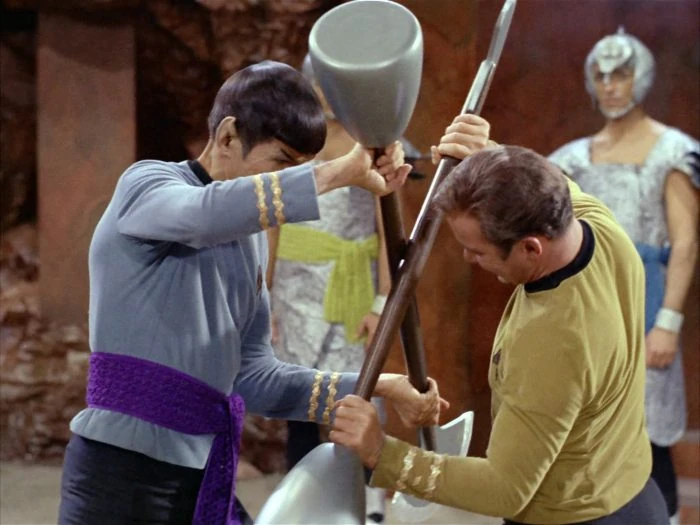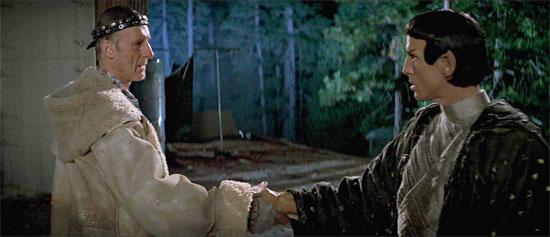Pull out the earbuds, folks. We are going to take a step back from looking at writing for a moment, and look at another tool a film uses to impart themes and emotions in the viewers: the music.

I was watching the first episode of the third season STAR TREK: PICARD, and heard a musical theme that surprised me and brought a smile to my face. A Ba'Ku theme from STAR TREK: INSURRECTION.

A small note here before we continue: EVER SO SLIGHT (BUT NOT REALLY) SPOILERS FOR SEASON 3 OF STAR TREK: PICARD.
Like seriously slight. We will avoid any major plot points in this post.
But back to my surprise: a theme from STAR TREK: INSURRECTION showing up in STAR TREK: PICARD. It is not unwarranted. Or even unappreciated.
But given that the show's season 3 end credits (and the score and writing of previous seasons) heavily borrow from STAR TREK: FIRST CONTACT (considered the "best" out of the Next Generation films), I was not looking out for Jerry Goldsmith's score from the ninth movie about the Ba'Ku.

We can examine the themes of Picard in a later post. But suffice to say the aforementioned theme comes in the show when Picard is talking to someone close to him about mementos from the past that he is reflecting on now. Memories of old friends and new.
Over this dialogue, you can softly hear this romantic theme:
It's a lovely theme, very romantic and magical.
Now I know... This is a blog about a book on writing Star Trek. What does any of this have to do with the gold pressed latinum price of raktajinos?
Well keep in mind that music can be a powerful tool used to reinforce the themes of a story - whether it be film, television, etc.
Music and scores and songs are the audience's emotional guideposts and are a window into the very soul of a show or film.
And while writers may not always (or rather quite rarely) have a say in the score of a film - they are the ones who guide the process long before notes are conceived to page.

The Star Trek franchise is no exception to this. Music has often been a hallmark of some of the most memorable trek moments, and cueing in the audience emotions.
The roaring theme of the Enterprise D whooshing through space toward new frontiers.
The lonely tune of a faraway station, resilient against the darkness of our times.
The hopeful march of a crew finding their way home.

This spot was supposed to be ENTERPRISE's theme "Faith of the Heart", but this is what most of you experience...
Or these powerful moments I'm sure you can "hear" without even playing any music:
Music doesn't just supplement the writing. It enhances it. And builds upon the very words written onto the page. And not just in content but also in form!
The music is literally constructed to reflect ongoing themes and action.
A great example of this would be from THE NEXT GENERATION: "The Best of Both Worlds Part I". Picard has been kidnapped by the Borg and assimilated into Locutus. One of the darkest moments for the crew of the Enterprise.
It's the end of the episode. There is no time to wrap up anything. Locutus has just revealed himself. "Resistance is futile." Riker is now in command and realizes he faces a difficult choice. The music begins building. Not the normal swell of the Enterprise theme, but the build of a tense ominous terror that Riker and the audience are now feeling.
The strings get faster. The notes start to get higher slowly. We are building to a precipice. A cliff we may fall off of. When suddenly-
"Mr. Worf... Fire." And the orchestra / score continuously crashes in an almost klaxon alarm that echoes the racing heartbeat and danger in the scene.
It's a moment that Michael Piller actually touches upon in his book, FADE IN: THE MAKING OF STAR TREK INSURRECTION. You'd be surprised to learn what was originally planned as the resolution to the cliffhanger. It's quite fascinating.
STAR TREK: INSURRECTION, scored by Jerry Goldsmith (the genius composer behind five of the Star Trek Films) is no different.
Take a listen to the Baku Village theme. A more peaceful, laid back theme that underscores the innocence of the Ba'Ku and their way of life. This paradise is simplistic, like its theme, and calls forth life and organic elements like moving water.
As we've discussed previously, Michael wrote in a whole arc for Picard and the crew of being so cluttered and caught up in life and the Dominion War and missing the simple things. Never taking time to slow things down. This theme evokes that peacefulness that Picard and crew discover and try to protect.
The theme is also softer than that of STAR TREK: FIRST CONTACT, as Michael and Producer Rick Berman wanted to shift the overall tone to something lighter than, say, a nearly unstoppable Borg attack on the Earth. This film was a return to the feel of THE NEXT GENERATION. Where action and intellectual thought went hand in hand.
And of course, here is the mystical and romantic theme we previously listened to, where Picard and Anij are trapped, and Anij (one of the leader Ba'Ku and love interest for Picard) has been hurt. In this moment, Picard learns to slow time down just for a moment to let his crew get to them in time.
It's a moment full of love and magic, and echoes the simplicity of the Ba'Ku theme as well as a return to a familiar theme and continuous note. A rejuvenation that Michael Piller had already enlaced in the emotional journey for Picard and the crew.
Literally the music echoes what is already going on in the film. The audience is learning to be in this moment and the need to be able to slow time to save this woman.
As composer Jerry Goldsmith once said in an interview around the release of the film:
"I think [the film is] more romantic [than ST: First Contact]. I think this film is a more romantic film than any of the others have been. I would say there's more action in this than there was in "First Contact", but I think that the subplots (include) a very lovely romantic story."
There is even a booklet that you can download, written with notes by Jeff Bond (author of THE MUSIC OF STAR TREK) that breaks down the different music tracks, and how the different intruments play into the themes of the music.
With the right composer, a film or television show's soundtrack can be an emotional guide for the audience, that not only cues how they should feel, but can literally cement moments in the film/show in their brains.
Recently hearing a theme from Jerry Goldsmith's INSURRECTION score made me pause, especially when older Picard is ruminating over memories and old friends.
In that moment. That brief instance - he and the audience are remembering what came before.
In writing this theme, Goldsmith taught us the power that Picard learns in INSURRECTION - the ability to slow down and stay in a single moment.

Writers, consider the ways that other parts of your films are contributing to your themes. Listen to soundtracks while you are writing, and that reflect what you want to express.
Audiences, take a moment to listen to the music that you hear when you watch a film. Or even think about your favorite soundtracks or movie moments!
Why are they so effective?
=/\= =/\= =/\=
Let me know what your favorite Trek Music moments are below!
For more on the film, check out FADE IN: THE MAKING OF STAR TREK: INSURRECTION by Michael Piller. You can purchase it directly on this site!
Until next time...
LLAP!
- Braxton






Comments